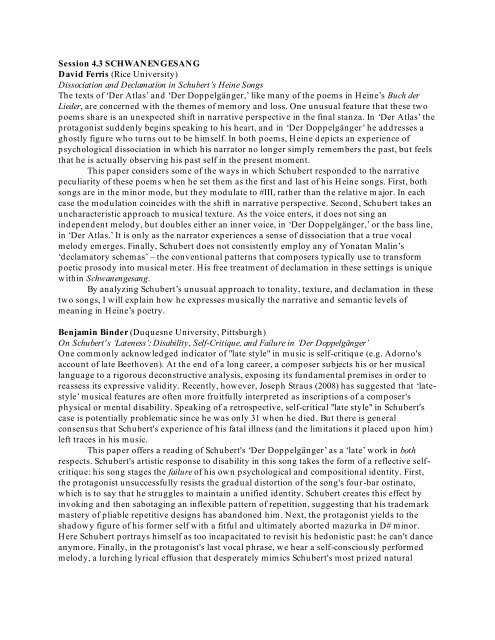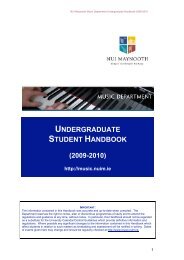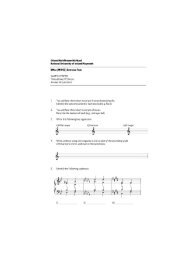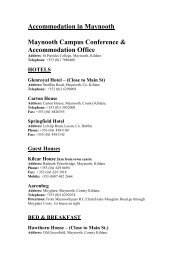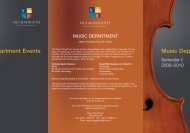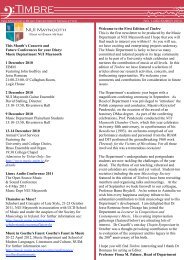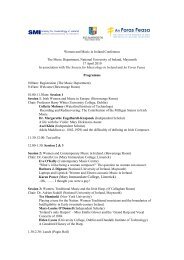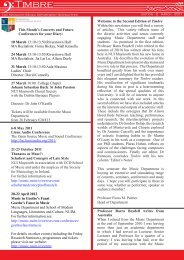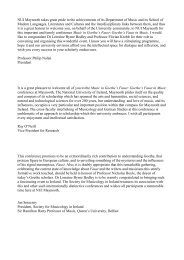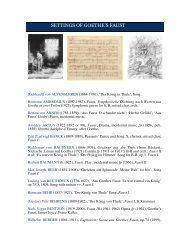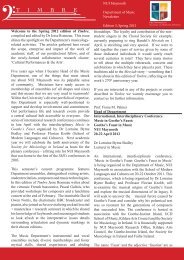Conference Booklet - Music - National University of Ireland, Maynooth
Conference Booklet - Music - National University of Ireland, Maynooth
Conference Booklet - Music - National University of Ireland, Maynooth
Create successful ePaper yourself
Turn your PDF publications into a flip-book with our unique Google optimized e-Paper software.
Session 4.3 SCHWANENGESANG<br />
David Ferris (Rice <strong>University</strong>)<br />
Dissociation and Declamation in Schubert’s Heine Songs<br />
The texts <strong>of</strong> ‗Der Atlas‘ and ‗Der Doppelgänger,‘ like many <strong>of</strong> the poems in Heine‘s Buch der<br />
Lieder, are concerned with the themes <strong>of</strong> memory and loss. One unusual feature that these two<br />
poems share is an unexpected shift in narrative perspective in the final stanza. In ‗Der Atlas‘ the<br />
protagonist suddenly begins speaking to his heart, and in ‗Der Doppelgänger‘ he addresses a<br />
ghostly figure who turns out to be himself. In both poems, Heine depicts an experience <strong>of</strong><br />
psychological dissociation in which his narrator no longer simply remembers the past, but feels<br />
that he is actually observing his past self in the present moment.<br />
This paper considers some <strong>of</strong> the ways in which Schubert responded to the narrative<br />
peculiarity <strong>of</strong> these poems when he set them as the first and last <strong>of</strong> his Heine songs. First, both<br />
songs are in the minor mode, but they modulate to #III, rather than the relative m ajor. In each<br />
case the modulation coincides with the shift in narrative perspective. Second, Schubert takes an<br />
uncharacteristic approach to musical texture. As the voice enters, it does not sing an<br />
independent melody, but doubles either an inner voice, in ‗Der Doppelgänger,‘ or the bass line,<br />
in ‗Der Atlas.‘ It is only as the narrator experiences a sense <strong>of</strong> dissociation that a true vocal<br />
melody emerges. Finally, Schubert does not consistently employ any <strong>of</strong> Yonatan Malin‘s<br />
‗declamatory schemas‘ – the conventional patterns that composers typically use to transform<br />
poetic prosody into musical meter. His free treatment <strong>of</strong> declamation in these settings is unique<br />
within Schwanengesang.<br />
By analyzing Schubert‘s unusual approach to tonality, texture, and declamation in these<br />
two songs, I will explain how he expresses musically the narrative and semantic levels <strong>of</strong><br />
meaning in Heine‘s poetry.<br />
Benjamin Binder (Duquesne <strong>University</strong>, Pittsburgh)<br />
On Schubert's ‘Lateness’: Disability, Self-Critique, and Failure in ‘Der Doppelgänger’<br />
One commonly acknowledged indicator <strong>of</strong> "late style" in music is self-critique (e.g. Adorno's<br />
account <strong>of</strong> late Beethoven). At the end <strong>of</strong> a long career, a composer subjects his or her musical<br />
language to a rigorous deconstructive analysis, exposing its fundamental premises in order to<br />
reassess its expressive validity. Recently, however, Joseph Straus (2008) has suggested that ‗latestyle‘<br />
musical features are <strong>of</strong>ten more fruitfully interpreted as inscriptions <strong>of</strong> a composer's<br />
physical or mental disability. Speaking <strong>of</strong> a retrospective, self-critical "late style" in Schubert's<br />
case is potentially problematic since he was only 31 when he died. But there is general<br />
consensus that Schubert's experience <strong>of</strong> his fatal illness (and the limitations it placed upon him)<br />
left traces in his music.<br />
This paper <strong>of</strong>fers a reading <strong>of</strong> Schubert's ‗Der Doppelgänger‘ as a ‗late‘ work in both<br />
respects. Schubert's artistic response to disability in this song takes the form <strong>of</strong> a reflective selfcritique:<br />
his song stages the failure <strong>of</strong> his own psychological and compositional identity. First,<br />
the protagonist unsuccessfully resists the gradual distortion <strong>of</strong> the song's four -bar ostinato,<br />
which is to say that he struggles to maintain a unified identity. Schubert creates this effect by<br />
invoking and then sabotaging an inflexible pattern <strong>of</strong> repetition, suggesting that his trademark<br />
mastery <strong>of</strong> pliable repetitive designs has abandoned him. Next, the protagonist yields to the<br />
shadowy figure <strong>of</strong> his former self with a fitful and ultimately aborted mazurka in D# minor.<br />
Here Schubert portrays himself as too incapacitated to revisit his hedonistic past: he can't dance<br />
anymore. Finally, in the protagonist's last vocal phrase, we hear a self-consciously performed<br />
melody, a lurching lyrical effusion that desperately mimics Schubert's most prized natural


